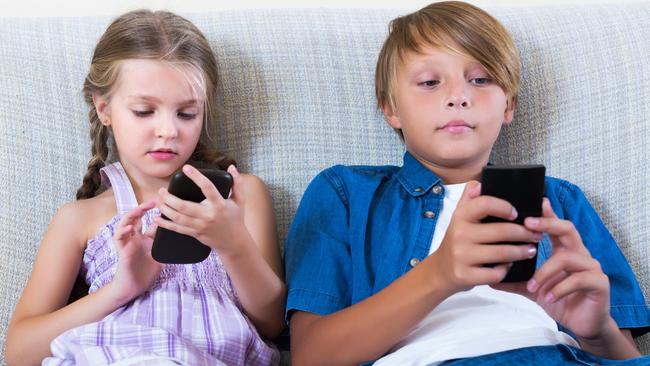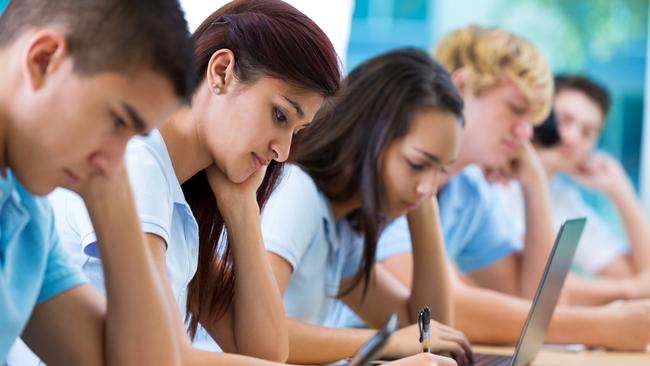
He had been working online as well as with old-fashioned pen and paper for some of the time because his school doesn’t allow devices in the classroom until after year 10 and it is among a growing number of schools that don’t allow them in English classes.
Many readers who commented on my last piece that argued parents – not government – are the ones who have control over the use of social media and the internet felt frustrated that their children’s schools were using devices, thus thwarting their efforts.
Many schools are aware of the problem: after all, what teacher wants kids messaging one another or playing games when they are supposed to be doing class work?
However, although many schools ban smartphones and tablets in the classroom, some parents baulk at banning them from the school precinct. Why parents who want the government to do the impossible and regulate social media are also reluctant to push for a general ban on phones at school can only be guessed at.
Sometimes they and their families have been so immured in smartphone and social media use from the time the children were born that banning the phone is trying to close the gate after the proverbial horse has bolted.
Sometimes they are simply controlling and anxious, the notorious “helicopter” type parents who can’t see that a kid who happens to catch a suburban school bus doesn’t need a phone; and sometimes it is because they are not at home when their children return from school and they feel they need to keep tabs on them.
Whatever the reason, schools are not the only ones at fault here and in fact schools have a need for interactive devices to send students exams and notes and receive essays in return. This will become more common.
An even greater challenge for teachers, children and parents will be when artificial intelligence becomes common in education. It already exists in social media and most teenage kids know about it, but so far it is something of a game. “Hey, look at this, try to pick it” – I’m sure readers know what I am talking about.
But if anyone thinks social media is bad or “toxic”, as newspeak has it, think about AI embedded in all devices and platforms. Social media already has softened up the entire population for this brave new AI world.

Last month, prestigious academic publisher Wiley & Sons announced it was closing 19 journals and had retracted more than 11,300 papers because they were compromised. The same is happening at IOP Publishing and Springer Nature.
But plagiarism is only one difficult area for future students, teachers and parents. The immediate problem is ethical. Kids often have no understanding of basic right and wrong, especially using social media, which feels anonymous but of course isn’t. Unless they receive a strong ethical and moral education at home, and it is not undermined at school, problems such as online bullying that worry parents so much will continue and possibly worsen.
There is no worse example of this than the way in which social media has undermined sexual ethics by the making and sending of sexual imagery and sexting. Some instances of blackmail, extortion and suicide can be traced to this appalling phenomenon.
One depressing aspect is how much morality is left out of the problem of young people sexting and social media addiction. We know this behaviour is not confined to teenagers.
Even the National Health and Medical Research Council doesn’t look at sexting as a problem of lax ethical and moral education, regarding it as “a normal part of teenage sexual exploration”. A bit of silly fun, it is not. It is sexual exploitation, and surely it is up to parents to set their kids straight – although judging by the scale of the problem, including nudifying apps, that isn’t happening.
As technology evolves it is understandable that we are all uneasy about potential problems, and deepfakes, built-in bias and misinformation, plagiarism and the ethical dimension of technology are problems even before AI becomes ubiquitous.
The idea that governments can do something because they already control the sale of cigarettes, pornography and alcohol is wrong: parents have to do that too.
The two most important things parents and teachers need to do now is to educate and prepare for the evolution of AI, and perhaps the only thing governments can do is to facilitate educational programs to understand it. Schools could start bringing parents into school precincts to discuss future problems and enhance their own technical awareness.
The curriculum can contribute. For example, is it such a big stretch to return to pen and paper exams? And what of introducing more viva voce type examinations for older and advanced students?
As for the idea that the government could pass legislation that would allow a kid to use social media only from the age of 16, forget it. Kids can get around anything, as I know, even playing games in three dimensions involving guns, swords and probably the Spartans. Most of these require age verification, a minor problem for the average tech-savvy pre-teenager, one of whom told me that some of the kids playing are “maybe about 10 because, you know, I can hear them”.







Recently at a family gathering I had an interesting conversation with my teenage grandson about the Spartans. He had an exam to do but obviously was enthusiastic about that grim lot, as he also had been about the Romans – all the really tough guys of history. As a former history teacher, I could tell he knew a lot. (Boys and old history teachers like that stuff.)